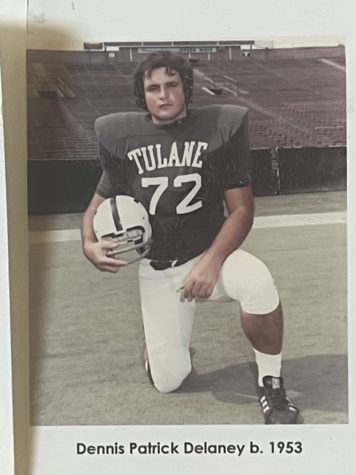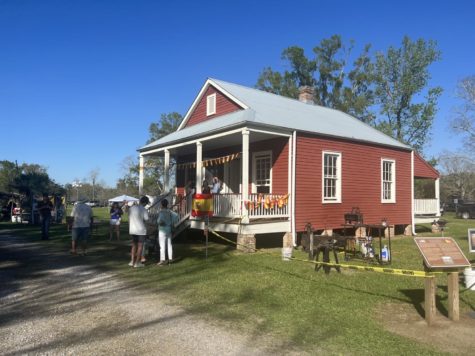Los Isleños Fiesta honors Louisiana folk legacies
March 9, 2023

For Dennis Delaney, former Tulane football player and history major, the 48th annual Los Isleños Fiesta was an opportunity to share his Canary Islander heritage through decades of genealogy research. Inspired by his cousin, Delaney has compiled and organized thousands of ancestral portraits since 1990.
“Somehow I got hooked into copying people’s pictures and … when my cousin came back with a whole bunch of genealogy, I decided to fill in the tree,” Delaney said. “Unfortunately, I didn’t know that my mother’s side of the tree included the whole nation.”
Alongside hundreds of family portraits, Delaney’s cousins also share their family stories with visitors who explore one of the community’s historical structures, the Cresap-Caserta House.
Ben Crowe, president of the Los Isleños Heritage and Cultural Society, said the organization aims to promote the history and folklife of one of Louisiana’s oldest communities originating from Malaga and the Canary Islands. Between 1777 and 1782, “Governor Bernardo Vicente de Gálvez y Madrid had planned carefully for the settlement of Isleño colonists in Louisiana,” strategically placing a buffer between Spain and Britain.
“I was an adult … when I realized I even had Spanish roots,” Crowe said. “It made me want to dig deeper into the records.”
Crowe said Spanish influence is often overlooked due to the dominant French presence in Louisiana. “There’s things that we use that we don’t even recognize as being from a Spanish root,” Crowe said. “It’s things like this that you learn and you say, well how much more is being omitted that we don’t know?”
William de Marigny Hyland, St. Bernard Parish historian and Los Isleños Museum complex director, said the fiesta has changed significantly since its establishment in 1976 in the fishing village of Delacroix. A celebration of culture through live music, food, exhibitions and folklife demonstrations, the festival engaged with nine historic Canarian structures dating back to as early as the 18th century.
“Before Katrina, we were really working to bring a lot of these buildings here and to bring many new things here,” Hyland said. “Of course, we had Katrina, but that didn’t stop us. Even the year of Katrina, … in March of 2006, we had our festival. The only thing that [ever] stopped us is the pandemic.”
Brittany Kennedy, senior professor of practice in Spanish and Portuguese and faculty principal for the College Scholars Program, said she wanted to bring her “Imagined Communities” cohort to see how the Isleños are preserving and reimagining their contribution to Southern Louisiana.
Junior and cohort member Richie Cantwell said he values the cohort program’s effort to burst the Tulane bubble and learn from native communities.
“I really appreciate the efforts that professors and programs like this one have made to burst that bubble and to get us out into the community and give us opportunities to learn and engage with these really unique communities and cultural and ethnic groups that really only exist and originated here in Louisiana,” Cantwell said. “I do think that’s a really important part of our education, and every Tulane student should do whatever they can to take advantage of those opportunities.”
In spring 2023, Tulane’s History Department only offered one course, Louisiana Folk History, to students interested in learning about the history of their school’s state.
“Why couldn’t have I known this stuff when I was a history major? I could have wrote all kinds of papers,” Delaney said.























Leave a Comment